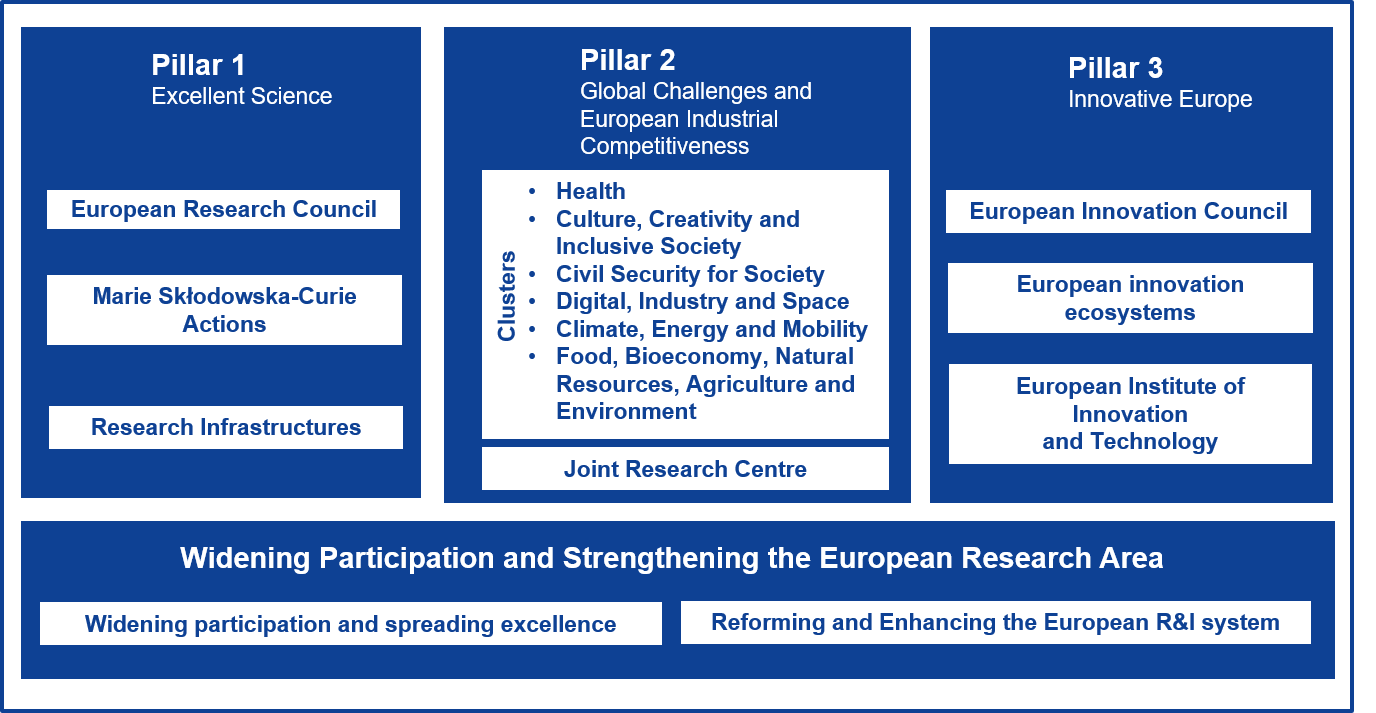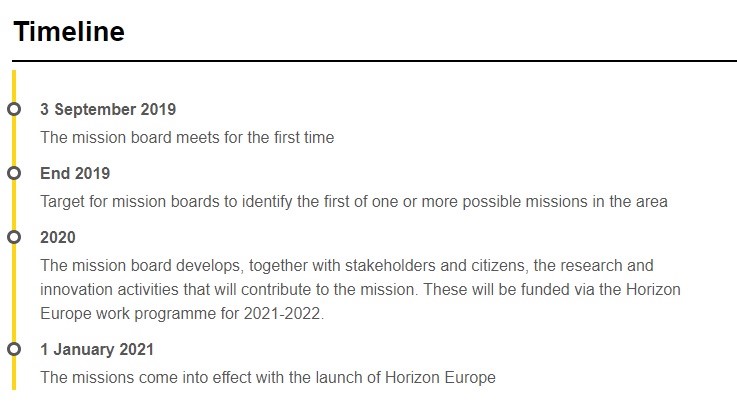The Commission's proposal for Horizon Europe is an ambitious 100 billion eur research and innovation programme to succeed Horizon 2020: EU research and innovation programme (2021-2027). On January 2020 and following the political agreement, the Commission has begun a strategic planning process.
The result of the process will be set out in a multiannual Strategic Plan to prepare the content in the work programmes and calls for proposal for the first 4 years of Horizon Europe.
The European Parliament and the Council of the EU reached in March and April 2019 a provisional agreement on Horizon Europe. The European Parliament endorsed the provisional agreement on 17 April 2019.
IMPLEMENTING HORIZON EUROPE - STRATEGIC PLANNING.
The strategic planning process should focus in particular on the Global Challenges and European Industrial Competitiveness pillar of Horizon Europe. It will also cover the Widening Participation and Strengthening the European Research Area part of the programme as well as relevant activities in other pillars.
The process will identify:
- Key areas for research and innovation support and their targeted impact;
- European partnerships;
- Missions;
- Areas of international cooperation.
The strategic planning process includes a co-design process that took place over the summer and autumn 2019 in view of preparing the first Strategic Plan for Horizon Europe. The views and ideas of more than 7,000 respondents were collected through web-based surveys and close to 4,000 participants engaged in in-depth debates at the 'European Research and Innovation Day's (Brussels, 24 - 26 September 2019).
The results of the co-design process are summarised in the document Orientations towards the first Strategic Plan for Horizon Europe.
IMPLEMENTING HORIZON EUROPE - STRATEGIC PLANNING.
The strategic planning process should focus in particular on the Global Challenges and European Industrial Competitiveness pillar of Horizon Europe. It will also cover the Widening Participation and Strengthening the European Research Area part of the programme as well as relevant activities in other pillars.
The process will identify:
- Key areas for research and innovation support and their targeted impact;
- European partnerships;
- Missions;
- Areas of international cooperation.
The strategic planning process includes a co-design process that took place over the summer and autumn 2019 in view of preparing the first Strategic Plan for Horizon Europe. The views and ideas of more than 7,000 respondents were collected through web-based surveys and close to 4,000 participants engaged in in-depth debates at the 'European Research and Innovation Day's (Brussels, 24 - 26 September 2019).
The results of the co-design process are summarised in the document Orientations towards the first Strategic Plan for Horizon Europe.
MISSION AREAS IN HORIZON EUROPE.
Horizon Europe should incorporate research and innovation missions to increase the effectiveness of funding by pursuing clearly defined targets.
The Commission has engaged policy experts to develop studies, case studies and reports on how a mission-oriented policy approach will work effectively. (1)
5 mission areas have been identified, each with a dedicated Mission Board and Assembly. They will help specify, design and implement specific missions in Horizon Europe.
1. Mission area: Adaptation to climate change including societal transformation.
-Climate adaptation is the process of adjustment to actual or expected climate and its effects.
-The mission area will support this process by connecting citizens with Science and Public Policy.
2. Mission area: Cancer.
-Cancer affects everyone regardless of age, gender or social status and represents a tremendous burden for patients, families, and societies at large.
-If no further action is taken, the number of people newly diagnosed with cancer every year in Europe will increase from the current 3.5 million to more than 4.3 million by 2035.
3. Mission area: Climate-neutral and smart cities.
-More than half of the world’s population now lives in urban areas. This is expected to reach 80% by 2050. Cities and metropolitan areas are centres of economic activity, knowledge generation, innovation and new technologies.
-They impact upon the quality of life of citizens who live and/or work in them and they are major contributors to global challenges.
4. Mission area: Healthy oceans, seas, coastal and inland waters.
-Healthy oceans, seas, coastal and inland waters are vital for our societies and the future of our planet. They are the lungs of our planet, producing half of the oxygen we breathe. They are a source of healthy food, contributing 16% of the animal protein we eat.
-They are the planet’s largest carbon sink and have absorbed 26% of anthropogenic carbon dioxide emissions since the beginning of the Industrial Revolution. They are home to the richest biodiversity on our planet.
-Also, they are the source of all life on Earth and our planet’s life-support system. They supply freshwater, renewable energy and provide benefits associated with our well-being, cultural values, tourism, trade, and transport.
5. Mission area: Soil health and food.
-Land and soils are essential for all life-sustaining processes on our planet. They are the basis for the food we grow as well as for many other products such as feed, textiles, or wood.
-Soils also provide a range of ecosystem services which are important for clean water, supporting biodiversity or for cycling nutrients and regulating climate. Indeed, soils are highly dynamic and fragile systems - and they are a finite resource. It can take up to 1,000 years to produce 1cm of soil.
-Soils are facing pressures from an increasing population with demands on land for production, settlement and industries.
-Moreover, soils are heavily affected by climate change, erosion and sea level rises. Approximately 33% of our global soils are degraded and in the EU, erosion is affecting 25% of agricultural land.
EUROPEAN PARTNERSHIPS IN HORIZON EUROPE.
Horizon Europe will support European partnerships with EU countries, the private sector, foundations and other stakeholders. The main objective is to deliver on global challenges and industrial modernisation through concerted research and innovation efforts.
The Horizon Europe proposal lays down the conditions and principles for establishing European Partnerships.
Kindly find below the 3 types proposed:
Co-programmed European Partnerships.
Between the Commission and private and/or public partners. Based on memoranda of understanding and/or contractual arrangements
Co-funded European Partnerships using a programme co-fund action.
Partnerships involving EU countries, with research funders and other public authorities at the core of the consortium.
Institutionalised European Partnerships.
These are partnerships where the EU participates in research and innovation funding programmes that are undertaken by a number of EU countries. They are based on article 185 of the Treaty on the Functioning of the European Union (TFEU) which allows the EU to participate in such programmes.
These can also be public-private partnerships established under Article 187 TFEU, such as joint undertakings or EIT Knowledge and Innovation Communities.
These partnerships will only be implemented where other parts of the Horizon Europe programme would not achieve the objectives desired or expected impacts. (2)
Horizon Europe should incorporate research and innovation missions to increase the effectiveness of funding by pursuing clearly defined targets.
The Commission has engaged policy experts to develop studies, case studies and reports on how a mission-oriented policy approach will work effectively. (1)
5 mission areas have been identified, each with a dedicated Mission Board and Assembly. They will help specify, design and implement specific missions in Horizon Europe.
1. Mission area: Adaptation to climate change including societal transformation.
-Climate adaptation is the process of adjustment to actual or expected climate and its effects.
-The mission area will support this process by connecting citizens with Science and Public Policy.
2. Mission area: Cancer.
-Cancer affects everyone regardless of age, gender or social status and represents a tremendous burden for patients, families, and societies at large.
-If no further action is taken, the number of people newly diagnosed with cancer every year in Europe will increase from the current 3.5 million to more than 4.3 million by 2035.
3. Mission area: Climate-neutral and smart cities.
-More than half of the world’s population now lives in urban areas. This is expected to reach 80% by 2050. Cities and metropolitan areas are centres of economic activity, knowledge generation, innovation and new technologies.
-They impact upon the quality of life of citizens who live and/or work in them and they are major contributors to global challenges.
4. Mission area: Healthy oceans, seas, coastal and inland waters.
-Healthy oceans, seas, coastal and inland waters are vital for our societies and the future of our planet. They are the lungs of our planet, producing half of the oxygen we breathe. They are a source of healthy food, contributing 16% of the animal protein we eat.
-They are the planet’s largest carbon sink and have absorbed 26% of anthropogenic carbon dioxide emissions since the beginning of the Industrial Revolution. They are home to the richest biodiversity on our planet.
-Also, they are the source of all life on Earth and our planet’s life-support system. They supply freshwater, renewable energy and provide benefits associated with our well-being, cultural values, tourism, trade, and transport.
5. Mission area: Soil health and food.
-Land and soils are essential for all life-sustaining processes on our planet. They are the basis for the food we grow as well as for many other products such as feed, textiles, or wood.
-Soils also provide a range of ecosystem services which are important for clean water, supporting biodiversity or for cycling nutrients and regulating climate. Indeed, soils are highly dynamic and fragile systems - and they are a finite resource. It can take up to 1,000 years to produce 1cm of soil.
-Soils are facing pressures from an increasing population with demands on land for production, settlement and industries.
-Moreover, soils are heavily affected by climate change, erosion and sea level rises. Approximately 33% of our global soils are degraded and in the EU, erosion is affecting 25% of agricultural land.
EUROPEAN PARTNERSHIPS IN HORIZON EUROPE.
Horizon Europe will support European partnerships with EU countries, the private sector, foundations and other stakeholders. The main objective is to deliver on global challenges and industrial modernisation through concerted research and innovation efforts.
The Horizon Europe proposal lays down the conditions and principles for establishing European Partnerships.
Kindly find below the 3 types proposed:
Co-programmed European Partnerships.
Between the Commission and private and/or public partners. Based on memoranda of understanding and/or contractual arrangements
Co-funded European Partnerships using a programme co-fund action.
Partnerships involving EU countries, with research funders and other public authorities at the core of the consortium.
Institutionalised European Partnerships.
These are partnerships where the EU participates in research and innovation funding programmes that are undertaken by a number of EU countries. They are based on article 185 of the Treaty on the Functioning of the European Union (TFEU) which allows the EU to participate in such programmes.
These can also be public-private partnerships established under Article 187 TFEU, such as joint undertakings or EIT Knowledge and Innovation Communities.
These partnerships will only be implemented where other parts of the Horizon Europe programme would not achieve the objectives desired or expected impacts. (2)
(1) Read more about the Commission's mission-oriented approach and download the studies that shaped it.
(2) Impact assessments are needed to justify new legislation as part of the Commission's better regulation agenda.
-The outcomes of these impact assessments and the strategic planning process will influence the identification of possible partnerships.
-For institutionalised partnerships, the Commission has published inception impact assessments.
-An open public consultation covering institutionalised partnerships based on Articles 185 and 187 TFEU will be published in early September.
(2) Impact assessments are needed to justify new legislation as part of the Commission's better regulation agenda.
-The outcomes of these impact assessments and the strategic planning process will influence the identification of possible partnerships.
-For institutionalised partnerships, the Commission has published inception impact assessments.
-An open public consultation covering institutionalised partnerships based on Articles 185 and 187 TFEU will be published in early September.
Tags :
5 MISSION AREAS IN HORIZON EUROPE
EU Research and Innovation funding programmes
EU research and innovation programme (2021-2027)
EUROPEAN PARTNERSHIPS IN HORIZON EUROPE
Horizon Europe
Treaty on the Functioning of the European Union (TFEU)
Posted by Ch. Óscar de Andrés, on Monday, March 2nd 2020 at 09:20
|
Comments (0)
Category
Recent posts
Archives
#Team Management #Gestión de Equipo International Business Development #Gestión de Equipo Comercial
5 MISSION AREAS IN HORIZON EUROPE
Acceso universal al tratamiento del sida
ACNUR
actor Pepe Sancho
ADHESIÓN DE CROACIA A LA UE
advertising / teleshopping spots
Africa
Alianza Atlántica
Alianza del Pacífico
Alibaba
Alibaba Group Holding Ltd.
AlipayApp
Amnistía Internacional
Ana Pastor
AnálisisyGestiónInteligenteDeDatos
Angela Merkel
Banco Central Europeo (BCE)
Banco Mundial
Barack Obama
batalla del sector del taxi y VTC
Benjamin Franklin
Bill Gates
binomio chavismo / antichavismo
Blockchain opportunities in international public health care sector
Blockchain technologies in health care
Blog Posts
Boris Johnson
Brexit
BUILDING THE CITIES OF THE FUTURE
China
Comisión Europea
Coronavirus
Covid-19
COVID-19
Cybercrime
David Cameron
Editorial Universitas SA
EU Convention of Human Rights
European Commission
FMI
Henrique Capriles
Human Rights
ICAA
International Business Development
Jack Ma
Jean-Claude Juncker
Mariano Rajoy
Obama
ONU
OSCE
The Council of Europe
Thomas Hammarberg
UNED
UNHCR
Unión Europea
Vladímir Putin








